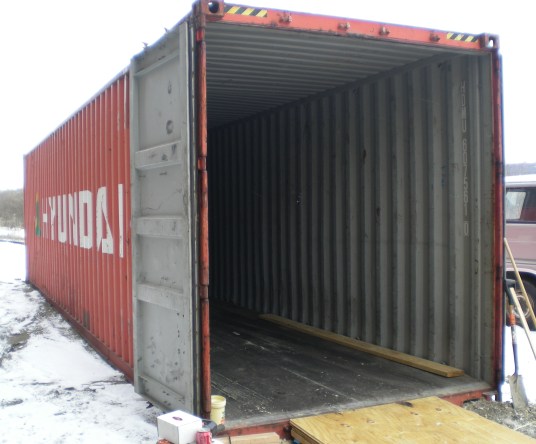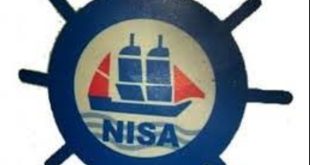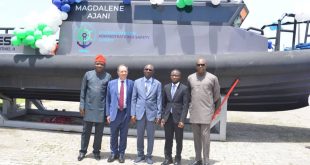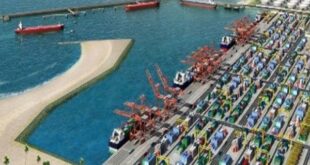
· How they flout CEMA, sell temporary imports
· Port Stakeholders want legislation to place duties on containers
By Kenneth Jukpor
As part of the efforts to curb the practice of abandoning empty containers in Nigeria by shipping companies, port industry veterans are considering introduction of import duties on containers which have outstayed the period tenable for temporary imports.
This is coming on the heels of accusations that shipping lines operating in Nigeria have turned the nation into a dumpsite for expired and damaged containers even as they sell the containers for other non-shipping services in the country.

Although shipping containers are classified as temporary import and exempted from import duties, the Customs Excise and Management Act (CEMA) stipulates that where such items are utilized for purposes other than the initial basis, import duties should be collected.
The Section 41 of CEMA on ‘Relief from duty of goods entered for transit or transhipment’ stipulates that; “…where goods are entered for transit or transshipment, the Board may allow the goods to be removed for that purpose, subject to such conditions and restrictions as it sees fit, without payment of duty.”
Section 42 of CEMA on ‘Relief from duty of goods temporarily imported’ adds that such import duty exemption must be, “Subject to any order made under subsection (2) of this section, where the Board is satisfied that goods are imported only temporarily and are intended to be re‐exported or consumed on board the importing ship or aircraft, it may permit the goods to be delivered on importation, or to remain on board the importing ship or aircraft for re‐exportation or consumption on board as the case may be, subject to such conditions as it sees fit to impose, without payment of duty.”
Given that most shipping containers spend years in the country, eventually sold and utilized for non-shipping purposes, shipping lines have been exploiting the temporary import clause in CEMA to maximize profit on the containers beyond the container deposits which are scarcely returned to shippers.
Speaking with MMS Plus newspaper on this, a former President of the National Association of Government Approved Freight Forwarders (NAGAFF) Chief Eugene Nweke stated that this challenge could become a huge revenue spinner for Customs and the nation at large.
“Getting a legislation to enable Customs collect duties on these containers would lead to huge revenue for the Service and the country. This would also curb the abandonment of empty containers by shipping lines in Nigeria. However, I envisage lots of challenges in getting this legislation because the shipping companies would also do as much lobbying as possible to prevent this. A former Customs Comptroller General, Mr. Ahmed Bello attempted this but didn’t get the desired outcome,” Nweke said.
According to him, if the sponsors of this idea could lobby the power brokers in the presidency as well as the legislature, the legislation could become a reality.
“The argument is that the shipping lines bring in containers for over six months and sometimes for years, yet the containers remain in Nigeria. Few years ago, NPA gave shipping lines an order that if they didn’t have empty container holding bays their vessels wouldn’t berth. NPA also insisted that if a vessel brings in 2000 containers is should also leave the country with 2000 empty containers. This was to prevent the abnormal practice of dumping thousands of containers in Nigeria and leaving empty,” he added.
Meanwhile, the Registrar of the Council for the Regulation of Freight Forwarding in Nigeria (CRFFN), Barr. Samuel Nwakohu stressed that the empty container conundrum in the country would require a policy framework to be developed by Nigerian Shippers’ Council (NSC) and Nigerian Ports Authority (NPA).
“These are policy issues that are worthy of consideration, however, we have to ascertain whether they conform to international best standards. CRFFN is a stakeholder but this does not directly fall under us. It is between Customs, Shippers Council and NPA. Although at the end of the day freight forwarders suffer it but you can see that I can’t intervene on this.”
Noting that such legislation would require a long process, he opined that it would require collective effort of port stakeholders to actualize.
“This is a policy issue and policy issues are not changed overnight. You need to look into it properly and study the pros and cons before you can make such a law. We can’t just make a law overnight, a whole lot have to go into it,” he added.
As part of efforts to compare global best practice on this, our correspondent studied the practice in Finland where customs clearance of temporarily admitted containers is needed before such containers are utilized for other purposes with additional charges inputted in the taxes when such containers are sold.
In Finland and other countries in Europe, containers are exempted from customs duties but are subject to value added tax (VAT) which the taxpayer is to declare to the Tax Administration. If a container which has been used as a means of transport and which is temporarily in Finland stays permanently within the European Union, for example for the purpose of sale, it must undergo customs clearance in order to be released free circulation.
Also, in cases where a container is sold or leased for another purpose besides use as a means of transport, for example for use as a storage or office facility, it must be cleared through Customs for release into free circulation and at this point charges are collected by the government as taxes.
In Nigeria, however, shipping containers are sold by shipping lines and other parties but the conditions of the trade between the seller and the buyer don’t indicate the party responsible for the customs clearance of the container as practiced in other climes.
Speaking on this, the President of the Africa Association of Professional Freight Forwarders and Logistics of Nigeria (APFFLON) Mr. Frank Ogunojemite posited that such legislation to make shipping lines pay duties on containers would stimulate them to provide a better framework for handling empty containers in the country.
“Such penalty would be very nice as it would spur the shipping lines to be serious and honest with the management of empty containers in Nigeria. They would realize that the stakes are high in the management of their containers. It would bring sanity into the container regime in the country,” he said.
On the contrary, the Chairman, Nigerian Ports Consultative Council (PCC), Otunba Kunle Folarin argued that there was no basis to subject empty containers to import duties as they are simply vessels to convey cargoes.
“You can’t place duties on containers used for imports because the containers didn’t arrive Nigeria empty. They were used to convey goods. You have to understand the port concession arrangement. These containers are in the concessioned areas and as such Customs shouldn’t interfere because the terminals have paid for the lease. These operators pay terminal fees and royalties on these containers. So, why should we consider placing duties on such items?” Otunba queried.
Other shipping experts claim that if the temporary import status of shipping containers as outlined by CEMA is premised on the transit nature of such cargo, it would be pertinent to place duties on the containers when they spend years and are eventually sold.
There are also indications that this practice to collect duties on overtime containers could correct the non-refund of most container deposits collected from importers and freight forwarders by shipping companies.
Container deposit refund has become one of the most problematic issues facing the port sector and freight agents in particular as traffic congestion along port access roads and other issues beyond the practitioners make timely return of the containers impossible, leading to loss of deposits and additional demurrage charges.
Also speaking on the proposal to get shipping lines pay duties on containers, a top Customs official who preferred anonymity lamented that shipping companies are taking empties from other countries but that isn’t the practice in Nigeria.
“Over the years, the accumulation of these containers has become a challenge. What can the nation do to return at least 80 percent containers for every vessel that comes into the country? This legislation to impose duties can become handy in addressing the container problems in the country,” he said.
According to him, if Customs recognize that empty containers are on temporary basis, the containers ought to go back otherwise they would be treated as regular cargoes.
“If shipping companies would leave the containers in Nigeria permanently, then they should pay duties and convert them to home use. These containers are occupying space in Nigeria when they should be on transit. The containers are used for other purposes and sold in the Nigerian market, hence, the owners of the containers should pay duties,” he argued.
Efforts to get reactions from Nigerian Shippers’ Council (NSC) and the association of shipping companies in Nigeria known as Shipping Association of Nigeria (SAN) were futile as at press time.
 MMS PLUS NG – Maritime, Aviation, Business, Oil and Gas News Online Newspaper with coverage in Maritime, Oil and Gas, Aviation, Power and Energy as well as Financial News
MMS PLUS NG – Maritime, Aviation, Business, Oil and Gas News Online Newspaper with coverage in Maritime, Oil and Gas, Aviation, Power and Energy as well as Financial News









